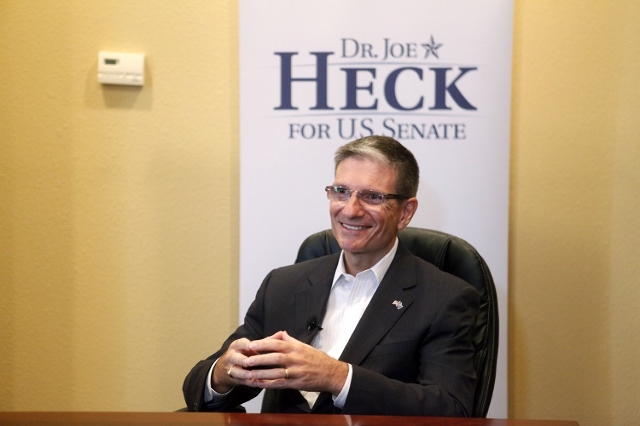Public service conflict for Heck
Rep. Joe Heck unquestionably has done a lot to serve his country.
Before winning election to the Nevada state Senate in 2004, or to Congress in 2010, or being commissioned in the U.S. Army Reserve in 1991, he graduated from osteopathic medical school. In 2007, he deployed to Iraq as commander of a medical company.
Whether working as an emergency room doctor at UMC or in a field hospital in Iraq, it's no exaggeration to say people are alive today who otherwise wouldn't be because of Heck.
But recently, the question has been raised in the Review-Journal about whether Heck's dual roles as congressman (and perhaps U.S. senator, an office he will seek next year) and as a reserve Army brigadier general could pose a problem.
The U.S. Constitution says (in Article I, Section 6) "no person holding any office under the United States, shall be a member of either House during his continuance in office." That separation-of-powers clause ensures the people making the laws are never the same as the ones carrying them out. But members of the reserve are exempt. (Several have served in Congress.)
But there's another factor, one that could be serious and significant.
Consider: Heck is deployed and on active duty on a Saturday. As such, he is sworn to preserve and protect the Constitution, which makes the president the commander-in-chief.
During his periods of training or active duty, Heck is legally prohibited from criticizing the president. Article 88 of the Uniform Code of Military Justice prescribes court martial for officers who use "contemptuous words against the President, the Vice President, Congress, the Secretary of Defense."
But then, on Sunday, Heck's deployment ends. He's no longer subject to the UCMJ. He returns to life in Congress. There, as a representative of his state and the Republican Party, he's almost obligated to use contemptuous words against the president!
And he has. Heck has criticized President Barack Obama on foreign policy and military policy. He's even voted to sue the president for failing to enforce the Affordable Care Act as written, saying Obama exceeded his constitutional authority.
So, what is a young, E-4 corporal serving in the Reserve 3rd Medical Command in Atlanta — where Heck is deputy commanding general — to think? What are the sergeants and young officers to think, watching one of their top officers claim the president lacks fealty to the U.S. Constitution?
To say that might be deleterious to good order and discipline is something of an understatement. As a general officer, Heck occupies a position of respect among his troops, and his opinion is more than a trifling matter.
But as a congressman and a senator, Heck is obligated to stand up for his constituents and for the ideas upon which he built his campaign. To say he should hold his tongue in order to be faithful to his military job, even when he's not actually doing it, is tantamount to saying he can't hold both jobs at once.
I called Heck with these questions in mind, hoping to get the insights of a soldier and would-be senator. He declined to respond. A spokesman said Heck wants to keep a clear line of separation between his political job and his military duties.
It's very unlikely Democrats would or could raise this issue without looking like they're attacking a patriot for his military service. Certainly, that's not my intent. Heck deserves the respect of every citizen for his efforts to keep the country safe, at risk of personal peril.
But the issue of what Heck should and should not say — in and out of uniform — won't vanish just because it's not in a TV ad or a campaign trail sound bite.
— Steve Sebelius is a Las Vegas Review-Journal political columnist. Contact Steve at 702-387-5276 or ssebelius@reviewjournal.com. Follow him on Twitter: @SteveSebelius






















